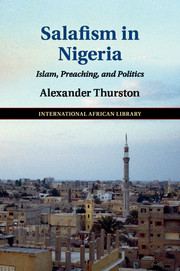Book contents
- Frontmatter
- Contents
- Acknowledgments
- List of Maps
- Introduction: Defining Salafism, Analyzing Canons
- Part I Salafism and Its Transmission
- Part II The Canon in Action
- 4 Teaching the Canon
- 5 The Canon in Religious Debates and Electronic Media
- 6 The Canon in Politics
- Part III Boko Haram and the Canon
- Conclusion
- Appendix 1 The Sermon of Necessity (Khuṭbat al-Ḥāja)
- Glossary of Persons
- Glossary of Arabic Terms
- Bibliography
- Index
- Miscellaneous Endmatter
4 - Teaching the Canon
from Part II - The Canon in Action
Published online by Cambridge University Press: 05 September 2016
- Frontmatter
- Contents
- Acknowledgments
- List of Maps
- Introduction: Defining Salafism, Analyzing Canons
- Part I Salafism and Its Transmission
- Part II The Canon in Action
- 4 Teaching the Canon
- 5 The Canon in Religious Debates and Electronic Media
- 6 The Canon in Politics
- Part III Boko Haram and the Canon
- Conclusion
- Appendix 1 The Sermon of Necessity (Khuṭbat al-Ḥāja)
- Glossary of Persons
- Glossary of Arabic Terms
- Bibliography
- Index
- Miscellaneous Endmatter
Summary
On the evening of Wednesday, August 16, 2006, Shaykh Jaʿfar Maḥmūd Ādam arrived late to the Saʿd Ibn Abī Waqqāṣ Mosque in Kano, Nigeria. He apologized to the crowd. He was tired from travel but would still deliver his lecture as planned. He would overcome his fatigue, he explained, because his speaking style was calibrated to the mood of his audience:
I'm one of the kind of people who, often, if I start to speak, those who are in front of me have an influence on what I should say, with the assistance of the Lord. I mean, those who are around me – if they are sleeping, there is a kind of speaking I will do. If, too, if they are disciplined, there is a kind of speaking I will do. If they are old, there is a kind of speaking I will do. Or if they are youth, the vanguard…
At this, the assembled young men erupted into cheers and laughter. The Shaykh laughed too. But then he turned serious, and introduced his subject. When he spoke a name, the room fell silent.
Imam Aḥmad ibn Ḥanbal: one of the scholars of the Sunna who came earliest in history. He is given the nickname “Imam of Ahl al-Sunna wa-l-Jamāʿa.” He is a man whose life the Lord Allah oriented toward working with ḥadīth reports of the Messenger of Allah, may Allah bless him and grant him peace. Writing them down, compiling them, teaching them to the Muslim community. He put them into practice during his lifetime.…Imam Aḥmad ibn Ḥanbal has a small abbreviated book that his son wrote himself from his mouth, in other words from the mouth of his father. In it he mentions some principles, or you might say poles, or pillars, on which the creed of Ahlussunnah is built.
This excerpt of Ādam's lecture confronts the outsider with the question at the heart of this study: Why would scores of young Nigerian Muslims flock to a mosque on a Wednesday night to hear about an eighth-century ḥadīth compiler?
In the previous two chapters, I showed that exposure to the Salafi canon was a primary source of differences between Izala and the graduates of Medina.
- Type
- Chapter
- Information
- Salafism in NigeriaIslam, Preaching, and Politics, pp. 117 - 139Publisher: Cambridge University PressPrint publication year: 2016

